Vikings, Norse Mythology and days of the week
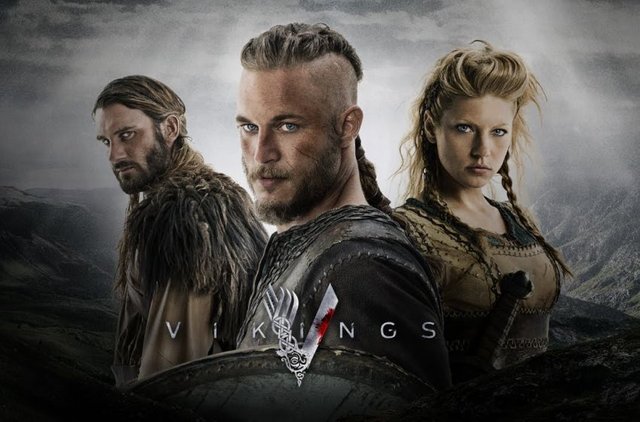
In recent weeks I have been addicted to watching Vikings on Amazon Prime and have become fascinated by their rich culture and mythology. In this post I will share my research on this subject.
The Viking homelands were in Scandinavia and the Viking age spanned from 800 to 1050 AD. Although widely known for their raiding and pillaging, Viking communities revolved around farming, fishing and trading. Their mastery of ship building enabled the Vikings to travel and settle as far south as Sicily and even as far west as North America / Canada.
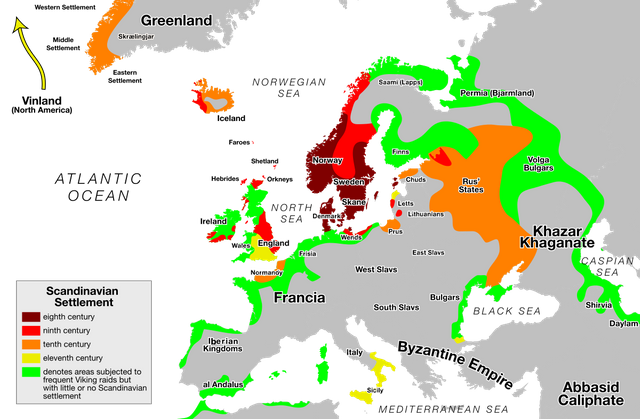
The Norse Cosmos
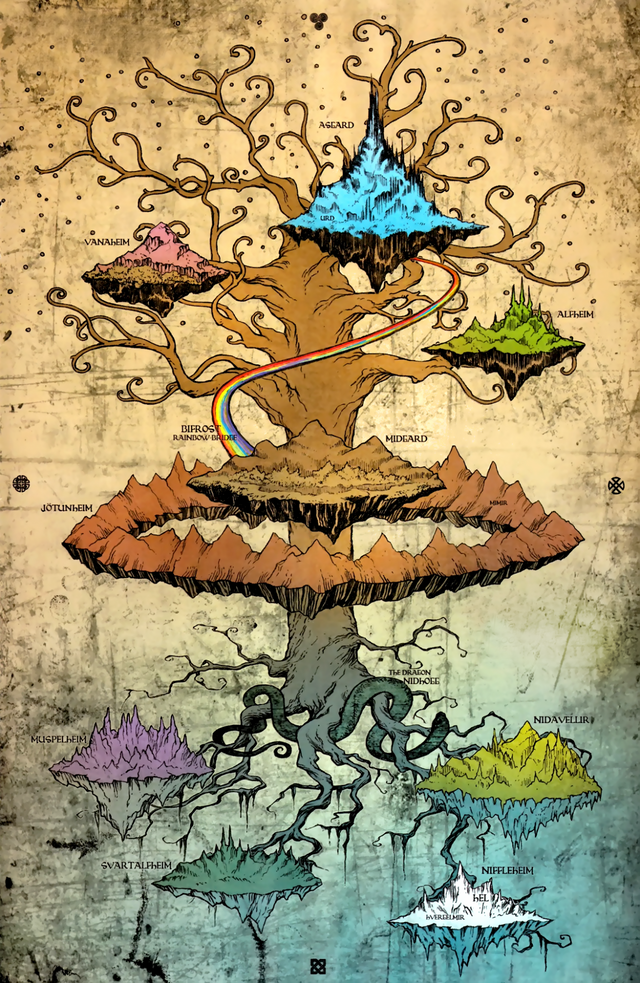
At the center of the Viking cosmos stands the ash tree Yggdrasil, growing from the well of Urd. Yggdrasil holds the nine worlds of Asgard, Vanaheim, Midgard, Jotunheim, Alfheim, Svartalfheim, Niflheim, Muspelheim and Hel. Vanaheim and Asgard are home to the gods. Humans share Midgard with trolls, giants live in Jotunheim. Dwarves inhabit Svartalheim and Alfheim is the home to elves. Muspelheim is a world of fire and Niflheim is the world of ice. Finally there is Hel, the land of the dead.
Creation
Before Midgard came into being, there was Ginnungagap, a place of silence and darkness that lay between Muspelheim and Niflheim. The flames of Muspelheim melted the ice of Niflheim, the drops of which formed into Ymir, a godlike giant. When Ymir sweated, more giants were born. As the ice melted further Audhumbla emerged, a cow that fed Ymir with her milk. She herself gained nourishment from licking the salt from the ice.
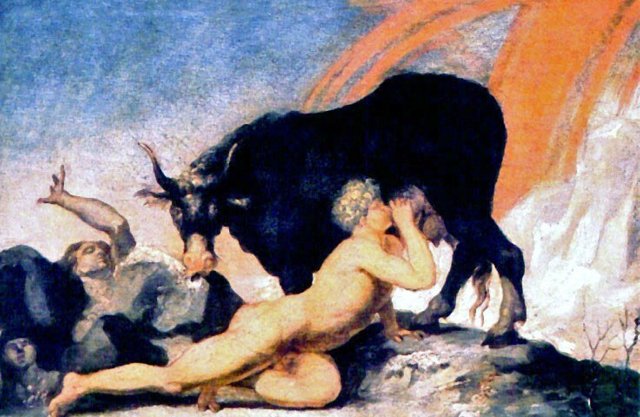
Audhumbla's licking eventually uncovered Buri, the first of the Norse gods. Buri had a son named Bor who married Bestla, the daughter of the giant Bolthorn. Bestla bore three half god, half giant sons called Odin, Vili and Ve. The brothers then went on to slay Ymir and built the world from his body. The oceans were made from his blood, vegetation from his hair, soil from his skin and muscles, clouds from his brain and the sky from his skull. Four dwarves held Ymir's skull above Midgard.
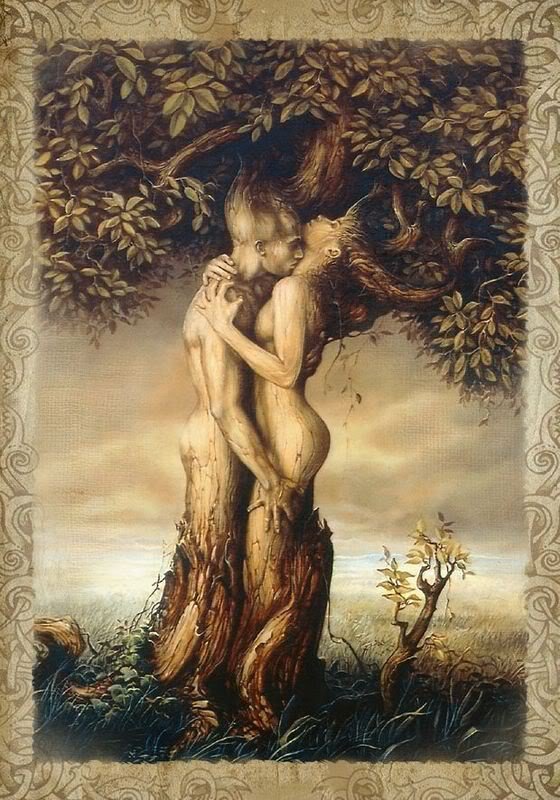
Fashioned from two tree trunks that had washed ashore, the gods then created the first man and woman, Ask and Embla. They gave them Midgard and built a fence around it to protect humanity from giants.
The gods
The list of Norse gods is quite long and runs to over fifty. There are also many other lesser gods and demi gods - a complete list can be found HERE for those interested. I will only mention some of the major ones.
Odin
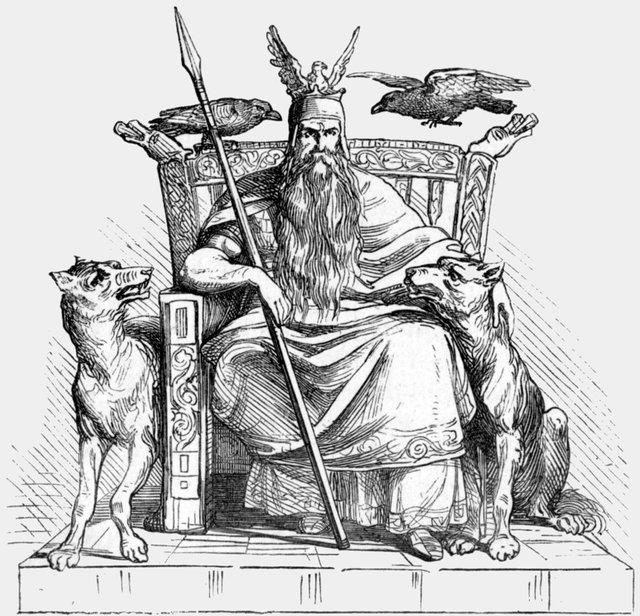
Odin was the father of the gods and men, known also as the allfather, the one-eyed seeker of wisdom, god of magic, war and runes. He was pictured with either a winged helm or a floppy hat. Upon his shoulders sat two ravens, Huginn and Munin - thought and memory. These would travel to Midgard and report back to Odin daily. Odin sacrificed one of his eyes in order to drink from the fountain of wisdom, his remaining eye was said to blaze as brightly as the sun. He also hung himself for many days from the tree of Yggdrassil to gain knowledge and power of the runes. His steed was Sleipnir, notable for having eight legs.
Odin was also accompanied by two wolves, Geri and Freki. As Odin consumed nothing but wine, he fed the wolves his food. Odin's wives were Jord and Frigg, his eldest son was Thor. It was said that half of those slain in battle would be taken by the Valkyries to Odin's hall, Valhalla, the other half to the goddess Freyja's hall, Folkvang. In the giant hall of Valhalla the heroes would be prepared for the oncoming battle of Ragnarok.
Odin is also known as Wotan in German and Woden in old English. Wednesday in English comes from 'Woden's Day'. Similarly, in Norse he is known as Oden and in modern Scandinavia Wednesday is 'Onsdag' meaning 'Oden's day'.
Frigg
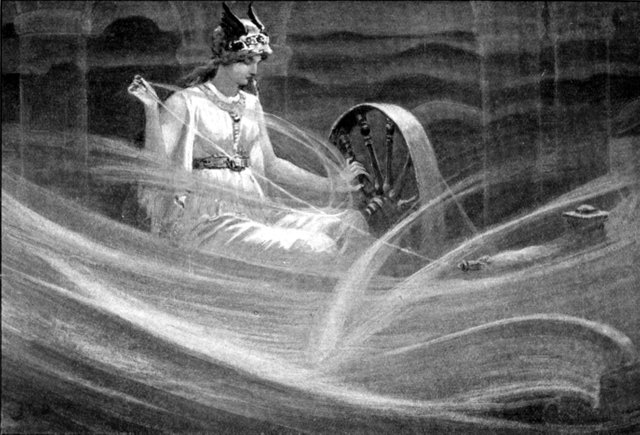
Also known as Frigga, she was one of Odin's wives and the mother of Baldur (Baldr, Balder or Baldor). She is the goddess of marriage, protector of children, goddess of the sky, motherhood, fertility and domestic arts. It was said she had the power of prophecy, but she would not reveal it. Friday may have been named after her or Freya (Freyja).
Baldur
God of love, peace and forgiveness, Baldur was the son of Odin and Frigga. He had the largest ship ever built called Hringhorni. Baldur dreamed he would be killed so his mother made everything on Earth promise not to hurt him. Mistletoe however did not promise. Loki, the trickster god, discovered this and created a spear made out of mistletoe and tricked Baldur's twin brother Höor into killing him. His death may have been the start of Ragnarok, the battle at the end of the world.
Thor
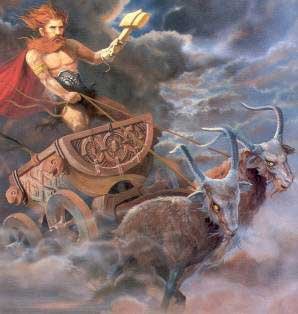
No look at Norse mythology is complete without discussing Thor, the red haired god of thunder, war, the sky and fertility. Son of Odin and the giantess Jörd, Thor travelled in a chariot drawn by goats and was considered to be the protector of Midgard. His hammer Mjollnir created lightning and destroyed frost giants and other enemies of the gods - once thrown the hammer would return to him. Thunder was said to be the rumble of his chariot. Thor chased away the frost and called for warm rains to melt the snow and ice. His goats were called Tanngrisni and Tanngnost - each night he would slaughter them for feasting upon, but they would reappear the next day. It comes as no surprise to learn that Thursday is literally Thor's day.
Loki
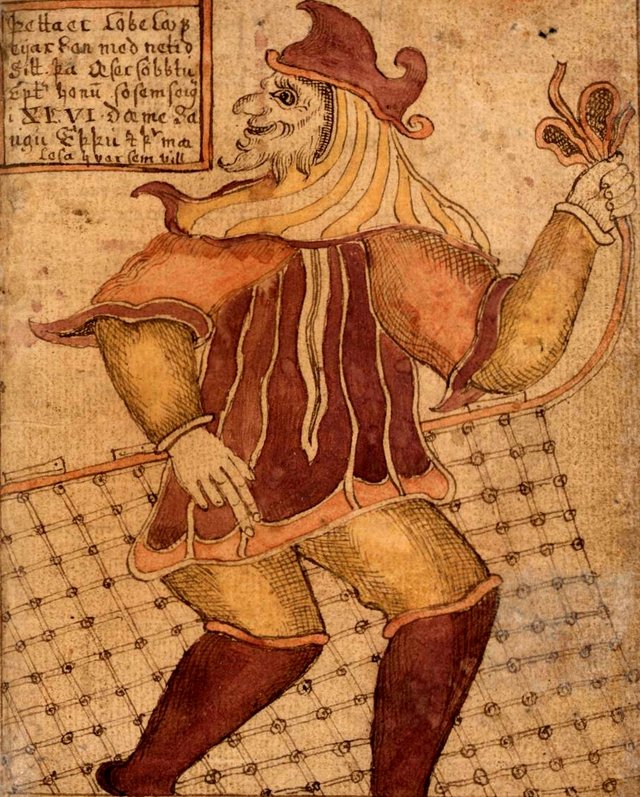
The son of two giants, and yet also the step brother (or blood brother depending where you read) to Odin, Loki is known as the trickster god and is also a shape shifter, appearing as a serpent, a horse, a salmon and a fly and he even changed sex. He was father to the wolf Fenrir, world serpent Jörmungandr and Hel. Loki is also the mother (yes, really) of Odin's eight legged horse Sleipnir. Loki is responsible for the start of Ragnarok - the 'Doom of the gods' and is also the agent of destruction in Midgard, causing earthquakes.
Hel
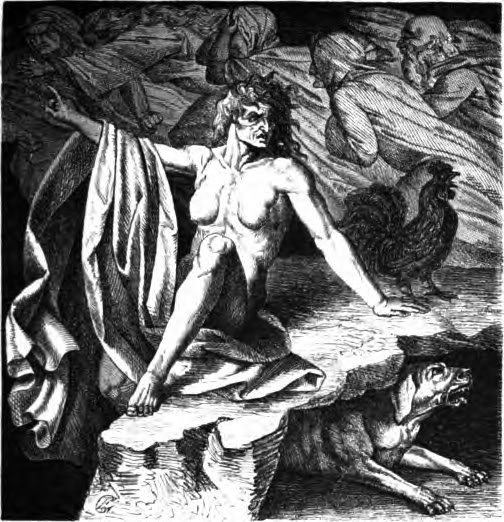
Goddess of the underworld, or land of the dead, Hel is the daughter of Loki and Angrboda, a giantess. She is described as having half a beautiful face thanks to her father, the other half ugly, due to her mother. From the waist down her body is dead and rotting, the rest is healthy and pink. It's interesting to note how similar the names of the Norse Hel and the Christian hell are.
Wait, you only named three days of the week with Norse origins

Yes indeed, but it should come as no surprise to learn that most of the rest of the days of the week also have Norse origins. Sunday comes from old English 'Sunnandæg'. Germanic and Norse mythology personify the sun as a goddess named Sunna or Sól. It literally means 'Sun's day'. Similarly Monday comes from old English 'Mōnandæg' named after Máni, the Norse personification of the moon, and also Sól's brother. Tuesday comes from 'Tīwesdæg' after Tiw, or Tyr, a one-handed Norse god of dueling. That leaves us with Saturday which originates with the Roman god Saturn as in 'Sæturnesdæg' which translates to 'Saturn’s day.'
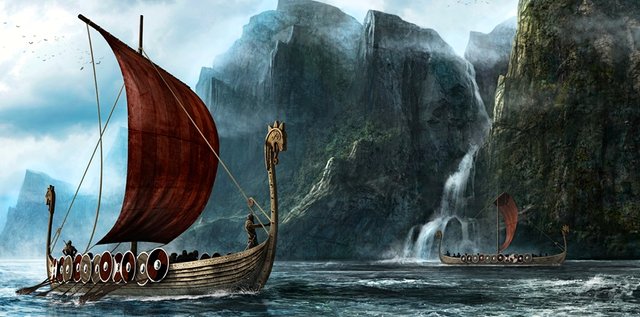
Image source 1, 2, 3, 4, 5, 6, 7, 8, 9, 10, 11, 12
Are you a writer or a keen learner? Do you wish to join a community of likeminded individuals who can help hone your writing skills in the fields of fiction, non-fiction, poetry or playwriting? Join us at The Writers' Block on Discord.

Great post, I've always been a bit obsessed by Norse mythology, you should try and read neil gaiman "Norse Mythology" ended up reading it to my wee five year old son (with a few modifications) and we both loved it.
Anyway really enjoyed the post.
Yes, that book is very good! It's a quick and easy read!
It really is and very easy to read, I did have to make some off the cuff updates for my wee son, but on the whole
I have read Neil Gaiman
s Norse Mythology, and as a person who have spend most of his life studying Viking history, i will say that Neil Gaimans best work by far is his stories about Sandman.But those stories really are amazing. :)
I would have to agree with you, I haven't read Sandman in a long time, think I might reread them, thanks for the comment.
hehe i actually have buy the entire Sandman serial 3 times now.
Because when i read it the first time, i thought it was so great that i gave them away to someone i knew would love it too.
But then, after some years i wanted to read it again, and then i had to buy it again.
And of course the same happen again, i got a visitor that had not heard about it, so i gave it away again.
And last year i wanted to read it even one more time, so i had to buy it again.. lol
This time i have learned, and will keep them, because i think that they are so great that i probably will enjoy reading them again 5 years from now.. lol
PS. you should read some of the things from Terry Pratchet too.
He was very much inspired by Sandmans world, and kind of copied it, but he added humor to the stories. (with Neil Gaiman`s blessing)
Thanks very much for that. I will see if I can find that book.
Wow, well done Gmuxx. I do have to say I love the Viking tv series. Looks like you put a lot of effort into this one... very interesting people and period. Recent news also about finding Islamic characters on some clothing. So much we still don't know.
Vikings is awesome. Always wanted to learn more about the show! Thanks for the post.
I will copy this map from you and use in a article about Khazaria too. ;)
Most people dont know about Khazaria and its history, because that have been censored in both schools and history books in the west since 1945/48.
And it is of great importance to know that history to better understand the situation the world is in to day. :)
Thanks for a great post. :)
When i saw the first picture of the entertaining, but silly Viking TV serial, i did not expect this post to be so good..
But i got surprised in a positive way. :)
As i am half Norwegian and half Icelandic (specially for the Icelandic side of me) it is naturally for me to be interested in and read a lot about Vikings.
And i have pretty much read most of the existing Viking saga`s.
I also have written some posts about Vikings, that i think you will find interesting.
I dont say this in hope of getting a vote, so forget about that part, i say it because i truly believe you will find those posts interesting. :)
I plan to make many more Viking posts in the future.
But my problem is that i have so many interests, and right now i am mainly writing geology posts.
But since geology and Vikings are my main interests, i will come back for even more Viking posts later.
For this post alone, and since it was not the common silly American picture of Vikings, i will follow you and come back to see if i find more interesting posts in your blog later. :)
I hope you have a great day when you read this. :)
I also want to add that the Viking age started long before the famous attack on Lindesfarne in 793.
But that was when the Viking age started for the foreign people.
And the reason the Viking attack started has been misunderstood for a long time.
They say it was because they then had invented the special Viking boats they used.
But the invention of those boats was simply a result of the fact that the Vikings at that time was forced to change trade with raiding, and for that reason they needed completely different ships then they needed for the traditional trade they had been done with the same people hundreds of years before that.
Around that time the European countries got a message from the pope that it was forbidden to trade with pagans (people who was not Christian, Jews or Muslims)
And that made it impossible for the Vikings to do the normal trading, and they started to raid the Christians for the same reason.
And when they discovered how helpless they had become after they had changed their weapons with bibles and prayers, it just become more and more popular to go on Viking tokt`s pretty soon.. lol
And they never ever used their woman as warriors as they do in the silly TV serials.
But a Viking woman was much more respected and had a lot more to say then the Christian woman in Europe had. ;)
(In the post about how Norway become a nation for the first time, you will get a little sense of that.) ;)
Scandanavia is cool
Nice post. No doubt about the book, Really it's a good book and ready easy @gmuxx
Maybe some story inspiration in here somewhere?
Thanks to provide Great New and Useful Information
I've only watched the first season of the show, it became weird around here because they kept changing when it was on.
Weirdly it's making the Marvel universe make a little more sense